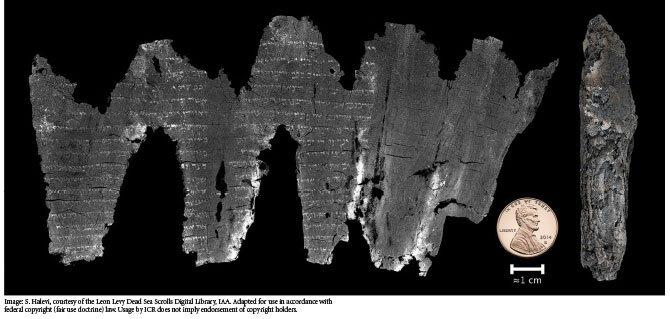I recently encountered a young man with no confidence in the Bible. His high school teacher taught him that a cluster of Catholic clergy cobbled the Scriptures together long after the events they describe—events like the Lord Jesus rising from the dead and the apostles traveling the world to proclaim His resurrection. Was his teacher right?
The Bible claims to convey God’s exact words across time. For example, “The words of the LORD are pure words, like silver tried in a furnace of earth, purified seven times. You shall keep them, O LORD, You shall preserve them from this generation forever.”1 In contrast, my new friend believes that those who supposedly scribbled Scripture from scratch actually mangled it with man-made mistakes. But significant archaeological discoveries provide new reasons to reject this idea.
The Dead Sea Scrolls rank near the top of a long list of Bible-confirming archaeological discoveries.2 Hebrew scribes hid this library in remote cliffside caves overlooking the Dead Sea in Israel and then covered the cave entrances before the Roman 10th Legion overwhelmed them in 68 A.D. Discovered by accident in 1946, the recovered scrolls include many books of the Bible.
Jars preserved the ancient documents like time capsules. When compared with modern texts, the Dead Sea Scrolls reveal virtually no differences after 2,000 years of Bible transmission. The few spelling changes and such did not alter the basic content of any verse. This disproves false stories about church authorities who supposedly sullied Scripture in its collection or transmission.
Another archaeological discovery also confirms biblical integrity. Archaeologists recovered third-century scrolls from Ein Gedi, Israel, in 1970. Unfortunately, they had been burned, leaving no hope to physically unroll them without them crumbling at the touch. But recent technological advancements enabled experts to virtually “unroll” 3-D images using sophisticated software and X-ray scans that pick up ink remnants.3 Now, for the first time, experts can decipher Hebrew characters from inside a rolled-up, charred scroll.4
Emmanuel Tov from the Hebrew University co-authored a technical report on the scroll scans.5 He told the Associated Press that the words were “100 percent identical” to the Hebrew book of Leviticus used today for Bible translations. “This is quite amazing for us. In 2,000 years, this text has not changed.”4
This finding should come as no surprise. God preserved His words from the generations that penned them right up to this generation because He will “preserve them…forever.”1
Did humans write the Bible’s words? Yes, but not apart from God. Those “holy men of God spoke as they were moved by the Holy Spirit.”6 And His faithful servants have been meticulously copying those exact words ever since.
Author’s note: It has come to my attention that in Psalm 12:7 quoted above, “them” probably does not refer to “The words of the LORD.” However, other Scriptures specify the principle in view—that God’s Word is everlasting. For example:
Psalm 119:160—The entirety of Your word is truth, and every one of Your righteous judgments endures forever.
Isaiah 40:8—The grass withers, the flower fades, but the word of our God stands forever.
Matthew 5:18—For assuredly, I say to you, till heaven and earth pass away, one jot or one tittle will by no means pass from the law till all is fulfilled.
John 17:17—Your word is truth.
References
- Psalm 12:6-7.
- Price, R. 1997. The Stones Cry Out. Eugene, OR: Harvest House Publishers.
- The process resembles the computed tomography (CT) scanning technology used in hospitals.
- Estrin, D. Scanning software deciphers ancient biblical scroll. Associated Press. Posted on bigstory.ap.org September 21, 2016, accessed September 22, 2016.
- Seales, W. B., et al. 2016. From damage to discovery via virtual unwrapping: Reading the scroll from En-Gedi. Science Advances. 2 (9): e1601247.
- 2 Peter 1:21.
* Mr. Thomas is Science Writer at the Institute for Creation Research.















